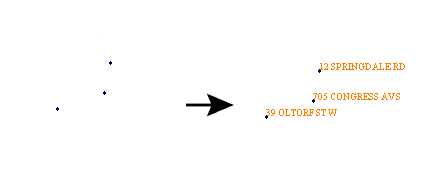Input features must have the correct geometry: point, line or area.
Replaces the geometry of the feature with a label point.
The insertion point of the text is guaranteed to be inside (in case of polygons) or on (lines and points) the original object. Note that since the text itself may be larger than an input area feature, the bounds of the label may exceed the bounds of the area.
Input features must have the correct geometry: point, line or area.
The features with the replaced geometry are output via this port.
Invalid features are output via this port.
Rejected features will have an fme_rejection_code attribute with one of the following values: EXTRA_FEATURE, INVALID_GEOMETRY_TYPE, INVALID_GEOMETRY_VERTICES.
The label to add to the geometry.
The label height is measured in ground units, and may either be entered as a number, or can be taken from the value of a feature attribute by selecting the attribute name from the pull-down list.
The label is rotated to prevent it from appearing upside down.

Using a set of menu options, transformer parameters can be assigned by referencing other elements in the workspace. More advanced functions, such as an advanced editor and an arithmetic editor, are also available in some transformers. To access a menu of these options, click  beside the applicable parameter. For more information, see Transformer Parameter Menu Options.
beside the applicable parameter. For more information, see Transformer Parameter Menu Options.
To generate a point that will be used as a centroid for polygons, use an CenterPointReplacer. This saves you the overhead of having a text object.
FME Professional edition and above
Associated FME function or factory: @GeneratePoint, PIPComponentsFactory
Search for samples and information about this transformer on the FME Knowledge Center.
Tags Keywords: LabelPointCreator TextReplacer